QuestionI recently lost a male P. taeniatus, and I'm trying to keep my female alive. I would like to know if you think these fish may have been injured by an algaecide I added to my tank, and more importantly if you think that damage is permanent.
I would also like advice on how to proceed if the female lives. I don't want to return her to the store, because I don't think she'll get the best care. I don't know if my tank is a safe place for her or her species. I may be able to find another homme for her, but I am hesitant to let her out of my care (not that I've been much help to her or her boyfriend so far!). I also don't know if she'll be happy by herself, or if I should risk another fishes' life by getting her a new man.
I love this little fish. I can't believe I've done this to her, and I'd welcome any thoughts on I can help her.
------------------ HISTORY --------------------
Both taeniatus are(/were) juveniles (around 3-4 cm long), probably from the same spawn. I've had them since February of this year. They have always been a little sensitive... when stressed, they go to the bottom and pump their gills rapidly and deeply for a long time. When I got them, I thought I was going to lose them for several days before they settled down.
About three weeks ago, I lost a dwarf gourami with no warning (which is how I lost two others earlier). A week later, I had an algal bloom, and I added what I thought was a normal dose of a popular algaecide (supposed not to harm fish) to the water. My gourami and both taeniatus began gasping; the "kribs" turned black, clamped their fins, and even tried to wedge themselves behind the spray bar, which I've seen them do in stores when stressed. I got them into my quarantine tank and did an immediate water change, and things eventually calmed down.
Water changes also stress my discus. About a week later, I lost a "runt" discus. He was hiding a lot, and I have read that runts often just don't make it. At the next water change, my taeniatus started gasping again. There was a terrible algal bloom again, and it seemed to be bothering the fish. I stupidly reasoned that the "krib's" earlier response may have been stress (I can't be certain if they dislike water changes or not, because they often hid during them). I thought losing the algae might reduce stress, so I used a very very small dose of the same algaecide (fool!).
My male was already hiding motionless, gasping, and obviously very stressed. Unlike the first time, they both retained their color, and there was no fin clamping, so I decided to wait. By the next day, the male taeniatus was barely able to swim, and the female was gasping badly. I've lost enough fish to know when they are going south, so I got the male in the quarantine tank, but by the time I caught the female, he was already dead.
I let the female rest in quarantine for a few days, but she didn't seem to improve... she even lost her color. After a lot of research, the only likely candidate about which I could do anything was a flare-up in infection due to stress. I decided she was probably strong enough for anti-parasite and anti-bacterial meds, and if she wasn't, she probably wouldn't make it anyway. I added normal doses of meds as a kind of Hail Mary. She initially reacted badly, but has continued to improve.
She's been calm, but skittish. Her gasping isn't as pronounced as before, but it is still alarming. She'll hide in a decoration for a while, then come out and hover near the bottom, sometimes at midwater if there is a bit of shade. When meds are added, she will sit on the bottom in front of a decoration, pumping her little gills and wiggling her pectoral fins, or hide behind the monstrous (for her) in-tank filter. She has become a little more engaging, despite my sometimes frantic searches for her, but she obviously isn't her usually chipper self. She doesn't seem to have eaten, but putting food in the tank gets a very subtle reaction from her.
I looked harder online, and I've found other instances of similar "krib crashes," a couple of which were associated with the use of algaecides. Needless to say, I have disposed of the algaecide, and I will never touch the stuff again!
------------------BACKGROUND DATA--------------------
I have a 100 gallon tank, with a large external canister filter, heater, airstones, and a small CO2 generator. Other fish include five subadult-juvenile Discus, 1 dwarf gourami, 2 Blue Rams, 10 Congo Tetras, 15 Phantom- and Serpae tetras, 16 Neon- and Cardinal tetras, a horsehead loach, a Siamese Algae Eater, two Ancistrus sp., two Otocinclus, six Corydoras, and four Khuli Loaches. Tank is planted with Amazon-, Argentine-, and Dwarf Chain Swords, Vallisneria gigantea, Crinum calamistratum, and Bannana Plants.
50% water changes occur once a week, with filter cleaning every other week. Buffer and water conditioner is placed directly in the path of the incoming replacement water. I used to add Flourish plant food and iron supplement, but that has been discontinued since the algal blooms.
At the time I put the fish in quarantine, my parameters were:
Temp: 84F
pH: 6.3 (buffered)
Nitrate: 10 ppm
Nitrite: 0 ppm
Ammonia: 0 ppm
Alkalinity: 90 ppm
Hardness: 120 ppm
These values are relatively stable long-term, with some moderate fluctuations in Alkalinity (usually it is a touch higher).
AnswerHi Jon,
I know of no direct evidence that an algicide can hurt fish but nonetheless I never use it because I equally don't know of any good evidence that algicide does NOT hurt fish.
It is also possible that the particular batch of algicide that you got has something wrong with it. In either case, I wouldn't use it again.
Algae blooms when there is an overabundance of light and nutrients. The best thing is to control those. There will always be some algae in a fish tank -- it is everywhere in the wild. I clean it off the front glass, but other than that, I generally leave it.
-- Ron
rcoleman@cichlidresearch.com
Cichlid Research Home Page <http://cichlidresearch.com>

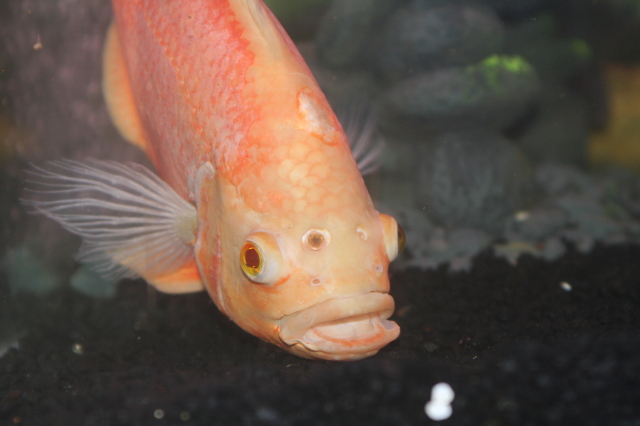 Jack Dempsy
Question
Oscar
Follow-up photo of the Oscar with hole i
Jack Dempsy
Question
Oscar
Follow-up photo of the Oscar with hole i
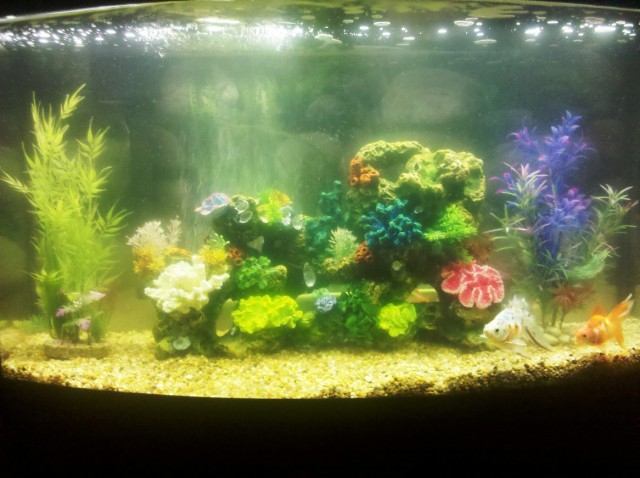 My tank water is green - help!
QuestionMy Tank
QUESTION: Hi,
I have a 46 gallon
My tank water is green - help!
QuestionMy Tank
QUESTION: Hi,
I have a 46 gallon
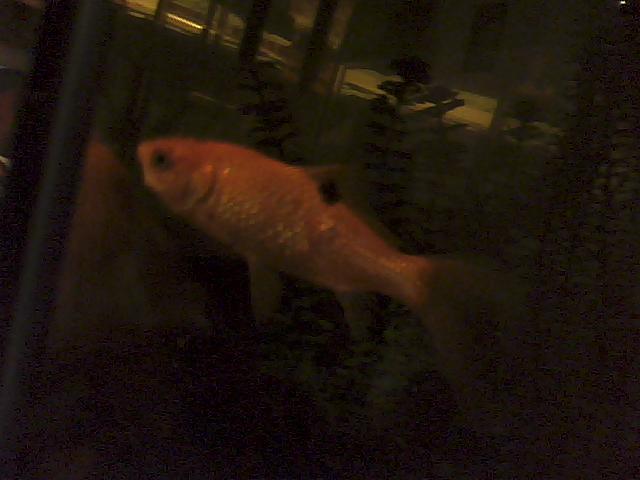 why is my fish dying?
QuestionQUESTION: Hi- my fish,Shrek, has been swi
why is my fish dying?
QuestionQUESTION: Hi- my fish,Shrek, has been swi
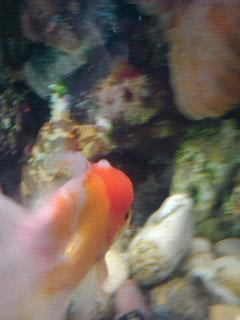 Oranda goldfish
Question
The bump Side view
Hi, I have 1 o
Oranda goldfish
Question
The bump Side view
Hi, I have 1 o
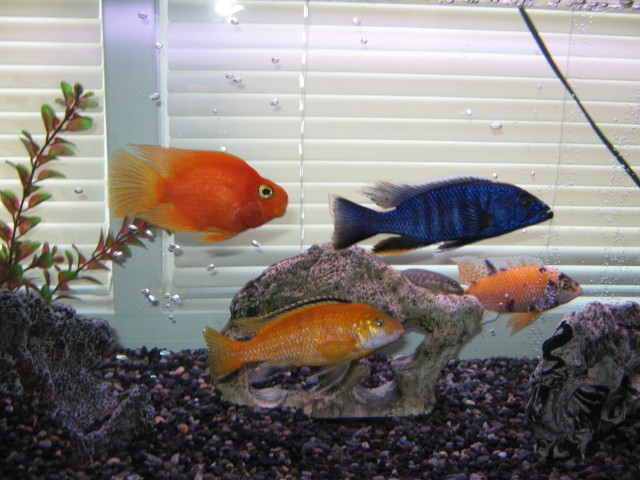 Cichlid males exhibiting mating behavior with each other
Question
My cichlids
Hi, I have 4 cichlids in a 30 gall
Cichlid males exhibiting mating behavior with each other
Question
My cichlids
Hi, I have 4 cichlids in a 30 gall